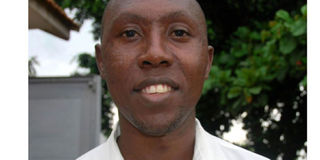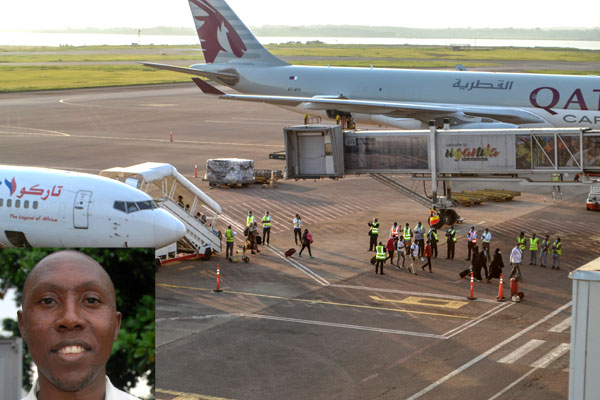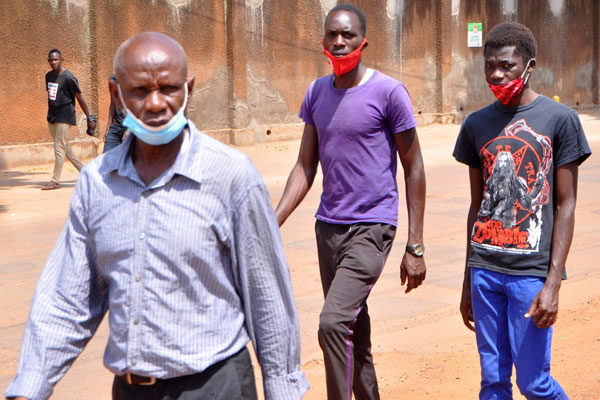‘Who is benefiting from Covid-19 business during this difficult time?’

Lino Owor Ogora
“...the countrywide lockdown and closure of the airport found me in South Sudan where I have lived and worked for the last three years. So for a long time, I was not able to come home and had to survive abroad. On June 9, after close to three months, I finally found a flight home. On landing at the airport, a medical team extracted samples for the Covid-19 test, and informed we would go through a 14-day quarantine period at our own cost. I had no problem with this because I was prepared.
The government had designated hotels, which provided high end and budget options. Based on this, I had made my own arrangements with a hotel in Kampala called Arch Apartments, which was also acting as a quarantine facility and they were offering me full board accommodation and meals at a cost of Shs200,000 a day.
Trouble is, the government team that met us at the airport gave us only two choices: Hilton Hotel in Kampala ($135 a night) and St Stephen’s Suites in Entebbe ($50 a night), excluding meals. I was naturally incensed that I could not be allowed to go to a government designated quarantine hotel of my choice. I protested, but nobody would listen.
In the end, I opted for St Stephen’s Suites, Entebbe, which was closer to my price range, only that I did not know what the food would cost me.
On arrival at St Stephen’s Suites, we were met by a jolly and plump manager who gamely informed us that our accommodation would cost $50 (about Shs187,000) a night, excluding meals. Not even breakfast. If we wanted full-board accommodation with meals inclusive then we had to pay an extra $30 (Shs112,000) a day, bringing the total to a whooping $80 (Shs299,000). This cost was not negotiable. He advised that it would be cheaper than ordering each meal separately.
Limited options
Because, I was tired, hungry, and thirsty, I opted to have dinner and weigh my options the following day when I was clearheaded. I ordered fresh fish stew and matooke, something I had missed daily while in South Sudan. When it arrived, it was disappointing both in the quality and in the quantity. The price was a whooping Shs30,000.
I ordered some beers to quench my thirst and the price was a whooping Shs10,000 per bottle. A bottle of water went for Shs3,500. The following day I ordered breakfast and it cost a whooping Shs38,000. For dinner and breakfast alone, I had clocked up Shs138,000 Ugandan shillings (close to $40). This cost was unsustainable. I had to find another solution.
The room I was allocated had a living area, a bedroom, and a kitchen with an electric cooker, a gas stove, and cooking utensils. I considered the option of cooking.
The following day, I called a friend who agreed to deliver fresh foods and groceries. However, when the delivery was made and the manager realised what I was up to, he quickly came up with a rule that cooking was not allowed in the rooms. I asked him why there was a fully stocked kitchen with utensils to go with? He was adamant, saying the policy was meant to avoid accidents. He told me the only equipment I could use were the microwave, the electric kettle and the blender, if I wanted. I was defeated. I did not know what to do with my stash of fresh food.
After brooding for a while, I decided to consult Mr Google regarding the extent to which I could use a microwave to cook. What I discovered far surpassed my expectation, aroused my curiosity, and motivated me into a several days of trial and error as I experimented with various recipes.
READ:
For my breakfast, I perfected the boiling of eggs, which was the only item I needed alongside bread, tea and fruit, which I had in plenty. For lunch and dinner, l learnt how to bake Irish potatoes, boil rice, spaghetti, and matooke. I learnt how to grill fresh fish, beef, and chicken. I even discovered I could make soup, including groundnut sauce and dried fish. All in a microwave. By the third day, I was practically confident I would survive the 14 days’ quarantine without relying on the hotel food.
The manager remained confident that hunger would soon force me to order his highly priced food. After waiting in vain for three days, he started getting excuses to come to my room, and discovered I was not starving.
Last resort
He checked to see that I was not using the electric cooker and gas stove, but having established that, he remained puzzled regarding how I was managing. After some days of bewilderment, he finally swallowed humble pie and asked, and I pointed to the microwave. He was astonished, but he could not reverse his decision for me to use the microwave.
After a few days I grew tired of my recipes. So I called another friend in Entebbe who put me in touch with a boda boda rider called Agaba. This fella made my life even easier. For Shs5,000 a trip, he delivered anything I wanted ranging from newspapers, fresh fruits, grilled chicken from Kitoro, juicy nyama choma, and even my favourite bell beer which was not on the hotel bar menu. The hotel only sold Heineken beer, a foreign brand. Agaba delivered large juicy water melons, oranges, and passion fruits which I blended into large quantities of fresh juice and drank all day long.
Another friend put me in touch with an Acholi woman who owned a restaurant in Entebbe specialising in Acholi cultural foods. She happily prepared recipes such as boo, malakwang and otwoo, which Agaba delivered.
The plump manager could do nothing but watch and seethe. After 14 days, the only significant bill I owed him was $700 (about Shs2.6m) for accommodation.
In the end, I am happy that I channelled a small amount of money into the local economy other than giving it all to one greedy hotel owner. Agaba made money on deliveries. The restaurant lady made a few bucks. The market sellers and vendors sold their produce. Imagine if 300 Ugandans in quarantine were doing this? Wouldn’t our local traders have a reason to hope?
My experience above begs the question: who is benefiting from other people’s misfortunes in this Covid-19 era? I personally know many hotels in Entebbe that would gladly charge much lower prices to take on quarantine residents returning from abroad.
Many boda boda riders such as Agaba, small restaurant owners, and market vendors are struggling to make ends meet and keep their businesses afloat, and they would gladly dig in to offer affordable options for returning Ugandans. But other than help them, the government’s focus seems to be on helping the big business owners.
As narrated to Caesar Lubanga Ken (June 23, 2020)





